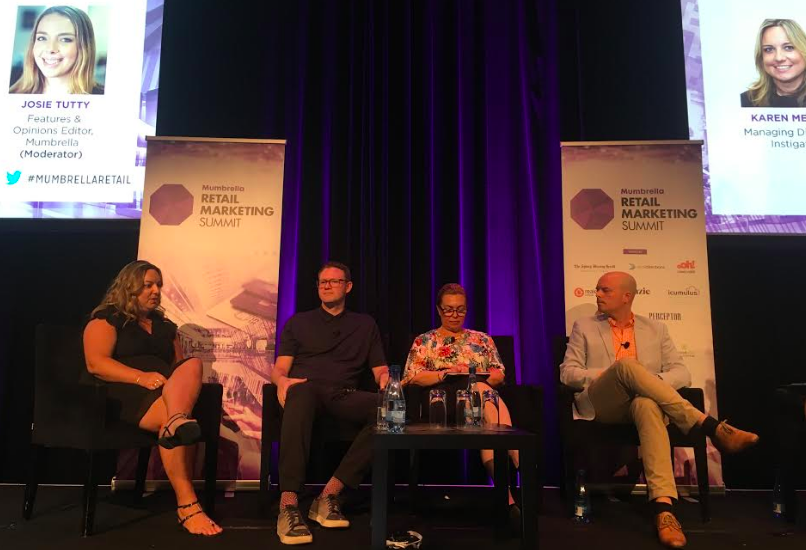Consumers becoming more promiscuous with brand loyalty: The Works’ Paul Swann
When it comes to brand loyalty, customers are behaving in a more promiscuous manner, the creative partner at RXP’s The Works, Paul Swann, has told the audience at Mumbrella’s Retail Marketing Summit.
Swann said despite the ongoing perception it’s younger people who are less loyal to the brands they spend time with, “we are all switching more, and we are all more promiscuous”.

Karen Messit, Paul Swann, Tina Cardinale and Radinck Van Vollenhoven
“We are all just more promiscuous because switching is so much easier than it ever was, we’ve done a great job at removing the barriers to switching.
“Rather than labelling it as an issue just relevant to younger audiences, it’s an issue across the board,” the creative said.
The Works’ creative partner did, however, outline the different “hot buttons” with younger generations.
“Younger people are after different things, design is more important in terms of decision making and how brands present themselves has become a bigger factor in influencing their behaviour.
“Customer experience is particularly pertinent to that audience group, there is an expectation that things just work, if you’re not getting that right that’s when people are going to take that opportunity to move to a brand that does work.”
Karen Messit, managing director of Instigate, said the way to instil brand loyalty is to begin with children as young as two, as they represent three different markets.
“Anything that instils a really great experience at a very early age can actually make you a loyal customer for life.
“Children represent three markets, they represent the immediate market, because they need children’s products, their pressure power is huge, so in the United States for example they equated $800bn worth of sales based on their influence over their parents’ purchasing decisions, and they’re the futures market.”
During the session on Building a Robust Relationship with Customers, Messit said most brands already have one personality but need to ensure they are having different conversations with a cross-section of ‘types’ of people.
“You have to realise who your different customers are, what stage of life they are at, and I would talk very differently to a student than I would talk to a retiree.
“They all have different needs as customers but you need to talk to them in the language they are going to be speaking in.
“You need to make sure you don’t speak in a language that they don’t understand and use too much jargon. You just need to speak to them very clearly with something they understand, don’t make it too complicated and make it relevant to their situation and what stage of life they’re at so the message actually means something to them.”


Did Karen Messit actually say that marketers should be targetting children as young at 2 or was this paraphrasing?
If she actually did say this did anyone in the room question it?
I think Karen’s point was that children as young as 2 have the ability to recognize brands. Ie. They know a minion when they see it.
Her view was that loyalty is a long term quest and that every brand interaction, even from a young age, forms a lasting memory structure.
I wonder about this concept. In a relationship there is two way loyalty. I have not seen much on how companies are loyal to their customers.
It think all this talk of company purpose within the community and customer loyalty via a few perks is completely undermined by many corporations actions when not paying tax. It may technically be within accounting rules, but it doesn’t show much loyalty to Australian society and hence why most Australians don’t feel any brand loyalty in return.